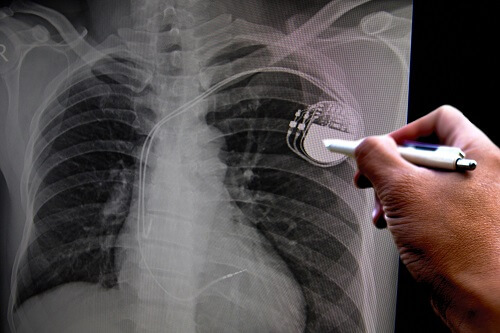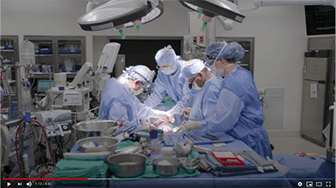Pacemaker Surgery-An Overview
A pacemaker is an electrical device/machine that helps stimulate the rhythmic contraction of the heart. Pacemaker implantation is one of the most commonly done cardiac procedure through which the cardiologist places the pacemaker device inside the patients’ chest. This minimally invasive surgery takes around 1-2 hours is done under local anaesthesia. Only the qualified and experienced cardiologists perform this delicate pacemaker surgery.
Pacemaker insertion is commonly done for the patients who are having very low heart beats. Such patients usually have degeneration of their natural pacemaker/conduction system in the heart or rarely by birth they have abnormal conduction system in the heart. If you are about to know the pacemaker costs in Bangalore, you will find a wide variety of these devices available at different prices and varies as per the type of pacemakers. Consult with Dr. Vithal. D. Bagi is one of the best cardiac surgeons in Bangalore to know more about pacemaker implantation surgeries.
What is a pacemaker?
Human heart has an electrical system which generates and conducts an electrical impulse to its muscle. Due this electrical stimulus heart muscle contracts and relaxes in coordinated way to maintain the circulation of blood. The part of the heart (Sinus node) which generates this impulse is known as the natural pacemaker of the heart. The abnormal function of this natural pacemaker or abnormal conduction of the impulse through its conduction system will lead to low heartbeat.
Very low heart beat can cause temporary loss of consciousness or giddiness or sudden cardiac death. Hence such patients do require artificial pacemaker to maintain normal heart beat. Artificial pacemaker work like inverter in the home. They monitor the heart rate every beat to beat and act only when heart don’t beat at required rate. They don’t interfere with normal heart rate. Once placed the artificial pacemaker usually function for 10-15 years (permanent pacemaker) without any maintainance (no medicines or repeat procedure required) .In case if the battery life ends after 15 years then only battery can be replaced.
Types of Pacemakers
There are three types of artificial pacemaker available.
- Single-chamber pacemakers have one lead in the upper chamber (atria) or lower chamber (ventricles) of the right side of the heart.
- Dual-chamber pacemakers have two leads. one lead in the right (upper chamber) atrium and one lead in the right (lower chamber) ventricle of your heart.
- Biventricular pacemakers: have three leads: one placed in the right atrium, one placed in the right ventricle, and one placed in the left ventricle (via the coronary sinus vein).
The doctor will choose the type of pacemaker depending on the patient’s heart condition
Along with the above types, heart rate increment with exercise, MRI field compatibility are the features to select the type of pacemaker needed.
Temporary pacemaker is a bridge procedure in case of emergency where doctor will insert a temporary pacemaker lead for some hrs till the permanent pace maker inserted. After the permanent pacemaker insertion temporary can be removed.
Indications of Pacemaker Surgery
The following are some of the common reasons why you should see a doctor for pacemaker surgery.
- Sinus Node Dysfunction leading to very low or irregular heartbeat
- Acquired Atrioventricular (AV) Block, Complete heart block
- Heart failure-Cardiac Resynchronisation Therapy
- Cardioinhibitory response on tilt table test
- Neurocardiogenic Syncope and Hypersensitive Carotid Sinus Syndrome
AICD- Automated Implantable Cardioverter and Defibrillator – An advanced pace maker like device which reverts abnormal life threatening increase in the heart rates and also does pace maker function at lower heart rates.
Pre-Procedure Guidelines for Pacemaker Surgery
If you are getting ready for pacemaker surgery, you can consult with Dr. Vithal. D. Bagi regarding the same. However, here is a list of measures one should take before the surgery.
- Not drinking or eating for four hours before the surgery
- To stop blood thinning medicines atleast 48 hrs before the procedure
- After admission,blood test and part preparation done.
- Cleaning and disinfecting of the cathlab area to prevent infection.
- Pacemaker insertion done under local anesthesia with a small incision (3 cm) in the skin below the collor bone.
- Lead placement is done under X ray guidance, position and pacing parameters will be verified.
- Pacemaker battery is placed below the skin and the skin is sutured.
Post-Procedure Guidelines for Pacemaker Surgery
Regardless of the pacemaker cost in Bangalore, pacemaker surgeries carry mild risks of infections. Hence, here is a list of care and precaution the patients should take after the surgery.
- Not to make the pacemaker insertion site wet for 10 days, till the suture heals.
- Continue antibiotics for 1 week.
- To have sponge bath for 10 days
- not to scratch or remove bandage till suture heals.
- Not to keep or use magnet on the pacemaker.
- To carry pacemaker card while going through metal detectors ( security check)
Why Choose Dr.Vithal. D. Bagi?
Dr.Vithal. D. Bagi is one of the most renowned and reliable cardiologists in Bangalore. He is one of the finest consultant cardiologists at Apollo Hospitals Jayanagar and Bannerghatta Road. He has the necessary skills and expertise for the pacemaker implantation. Procedure will be done under the local anaesthesia with small skin incision without cutting muscle or bone and sutures are placed only for the skin. Strict aspetic precautions will be taken to ensure less chances of infection. Permanant pacemaker insertion is one-time lifesaving procedure, once done has battery life of 10-15 years. Patient may not need any medicines or other procedures to maintain the longevity of pacemaker.
Call us at +91 9611592145 to book an appointment and to know more about the pacemaker costs in Bangalore as well.
FAQs
1. What are the signs that you require a pacemaker?
If you experience symptoms like a slower pulse rate, dizziness, extreme fatigue, chest pain, breathing difficulty, and fluttering or irregular heartbeats, there are high possibilities that you need a pacemaker. Sudden fainting also indicates that it’s high time to get yourself checked by a cardiologist to find out whether you need a pacemaker.
2. How does a pacemaker system get implanted?
The first step of traditional pacemaker implantation begins by making a tiny incision (around 5 cm long) on the patient’s upper chest. Next, a lead wire (thin and insulated) gets guided through the patient’s vein into his heart. The wire gets connected to a pacemaker, which is then programmed.
Once the pacemaker is ready, it gets inserted underneath the patient’s skin. The surgeon will test the device to see whether it is functioning properly or not. If he is happy with the results, he will close the incision.
3. What is the most common age to get a pacemaker?
Surveys conducted over the years have revealed that more than 80% of people getting a pacemaker are elderly. The median age of people receiving a pacemaker implant is 75 years (± 10 years).
4.Can I suffer from a heart attack after implanting a pacemaker?
Some studies do show that one can have a heart attack after getting a pacemaker. However, getting the surgery done by an experienced surgeon and at a top facility will significantly reduce your chances of having such complications.
5. Can I feel the pacemaker when it’s working?
It’s unlikely that you’ll feel the pacemaker working. However, you need to remember that pacemakers are rate-responsive devices. This means they will work according to your changing heart rate based on your activity level.
6. Is it safe to take a flight with a pacemaker?
Ideally, you should wait for a specified period before your start flying or travelling following the implantation of a pacemaker. Your doctor might ask you to avoid flying 6 months to a year after the surgery.
7. What should you avoid once you get a pacemaker?
- Don’t undergo MRI (stay away from MRI machines) and stay away from large magnetic fields.
- Don’t forget to turn off big motors when working with them (these include motors of cars, boats, etc.).
- Avoid diathermy.
- Stop lifting heavy objects.
- Doctors might ask you to stop making certain arm movements.
8. Do you experience chest pain with a pacemaker?
You may feel chest pain if the pacemaker gets perforated. This makes it mandatory for you to get yourself checked at regular intervals after the pacemaker implantation.
9. How often should you get your pacemaker checked?
You should go for the first check up six weeks following the pacemaker implantation. After that, you should visit the doctor to get the device checked and battery function evaluated once every three to six months.
10. How much does a pacemaker surgery cost?
The pacemaker cost in Bangalorevaries from INR 1 lakh to 9 lakhs. Other than that, you’ll need to spend on medicines and hospital stay. If you undergo pacemaker implant surgery at a reputable clinic, you can expect the process to be completed for a reasonable amount.
11. How much does it cost to replace a pacemaker battery?
Your pacemaker battery may run for 10 to 15 years depending on its quality and specifications. If your doctor finds that the battery is not working properly, he will advise you to get it replaced. In India, the expenses of replacing a pacemaker battery vary depending on the type of device you are using.
12. How much does a pacemaker cost in India?
The pacemaker cost in Bangalore, India ranges betweenINR 1 lakh and 9 lakhs. Your doctor will help you to choose a device depending on your budget and health needs.














 Consultant cardiologist in Apollo hospitals Banerghatta road and Apollo hospitals Jaynagar from 2013 to present.
Consultant cardiologist in Apollo hospitals Banerghatta road and Apollo hospitals Jaynagar from 2013 to present.





